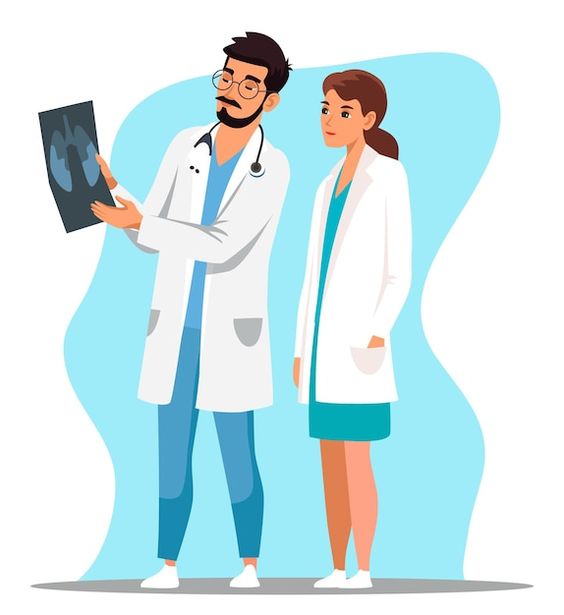
Table of Contents
The Power of Clinical Reasoning in Nursing
The dynamic healthcare environment presents nurses with a constant stream of challenges. Patients with complex conditions, evolving medical knowledge, and ever-changing situations demand more than rote memorization of protocols. In this intricate dance between patient care and sound decision-making, clinical reasoning emerges as a vital skill, setting nurses apart from those who follow orders.
Clinical reasoning goes beyond basic critical thinking. It’s a dynamic process that integrates a nurse’s knowledge, experience, and analytical abilities to navigate uncertainty and make sound clinical judgments at the bedside. Unlike basic critical thinking, which focuses on analyzing information and reaching a conclusion, clinical reasoning in nursing demands a cyclical approach. Nurses continuously gather and analyze patient data, formulate hypotheses, and refine their reasoning based on ongoing assessments and responses.
The benefits of clinical solid reasoning skills are far-reaching. For nurses, it fosters autonomy, enhances job satisfaction, and promotes professional growth. For patients, it translates to improved care quality, more accurate diagnoses, and reduced risks of errors. Ultimately, a healthcare system empowered by nurses with strong clinical reasoning skills delivers a higher standard of care, optimizes resource allocation, and fosters better patient outcomes.
Building the Scaffolding: Cornerstones of Strong Clinical Reasoning in Nursing

Clinical reasoning in nursing is a complex skill built upon a sturdy foundation of knowledge and abilities. These cornerstones empower nurses to analyze patient data, make sound judgments, and deliver optimal care.
1. A Strong Knowledge Base:
The bedrock of clinical reasoning is a comprehensive understanding of nursing science, pathophysiology, pharmacology, and evidence-based practice. A solid grasp of these core areas equips nurses to:
- Interpret Patient Data: Understanding normal and abnormal physiological parameters allows nurses to identify potential problems during assessments.
- Formulate Hypotheses: Knowledge of disease processes informs the development of possible explanations for a patient’s signs and symptoms.
- Select Appropriate Interventions: A strong foundation in pharmacology ensures nurses can choose the most effective and evidence-based medications for specific conditions.
2. Clinical Judgment: Merging Knowledge with Experience
Clinical judgment is the art of integrating a nurse’s knowledge base with their clinical experience to make sound decisions at the bedside. It involves:
- Data Analysis: Critically evaluate patient assessment findings, medical history, and diagnostic test results to identify relevant patterns and potential issues.
- Prioritization: Sorting through multiple concerns and focusing on the most urgent or life-threatening problems first.
- Integration of Knowledge and Experience: Drawing upon established knowledge of best practices and personal experience in similar situations to formulate a sound clinical plan.
3. Proficiency in Clinical Skills
Clinical skills are the hands-on tools that translate clinical reasoning into action. Nurses with strong clinical skills can:
- Conduct Comprehensive Assessments: Gather accurate and detailed patient data through physical examinations and interviews and monitor vital signs to inform clinical reasoning.
- Perform Interventions Effectively: Implement the chosen interventions precisely and safely, achieving the desired outcomes.
- Interpret Results: Analyze the effects of interventions and patient responses to refine their clinical reasoning and adjust the care plan as needed.
4. Effective Communication: The Cornerstone of Collaboration
Clinical reasoning is a collaborative endeavor. Strong communication skills are essential for:
- Gathering Information: Effectively communicating with patients and families to elicit a thorough history and understand their perspectives.
- Collaborating with Colleagues: Clearly articulating observations, assessments, and clinical reasoning to physicians, pharmacists, and other healthcare professionals to ensure coordinated care.
- Explaining Clinical Reasoning: Providing clear and concise explanations to patients and families about the rationale behind assessments, interventions, and planned care.
By mastering these cornerstones – a solid knowledge base, sound clinical judgment, proficient clinical skills, and effective communication – nurses build a robust foundation for exceptional clinical reasoning in practice.
Navigating the Maze: Stages of Clinical Reasoning in Nursing
Clinical reasoning in nursing is a dynamic, cyclical process that unfolds in distinct stages. These stages guide nurses in gathering information, formulating a plan, and continuously evaluating its effectiveness to deliver optimal patient care.
1. Data Collection: The Foundation
The journey begins with a meticulous data collection process. Nurses employ various tools to gather comprehensive information:
- Comprehensive Assessment: Conducting a thorough physical examination, reviewing vital signs, and assessing pain levels paints a picture of the patient’s health status.
- Medical History Review: Obtaining a detailed medical history, including past illnesses, medications, surgeries, and allergies, provides valuable context for interpreting current symptoms.
- Diagnostic Test Analysis: Analyzing the results of laboratory tests, imaging studies, and other diagnostics helps identify potential abnormalities and confirm or rule out suspected problems.
2. Data Analysis and Problem Identification:
Once data is collected, the analysis phase begins. Nurses meticulously:
- Identify Patterns and Discrepancies: They scrutinize the data, searching for patterns, inconsistencies, or abnormal findings pointing to potential problems.
- Prioritize Concerns: Nurses don’t operate in a vacuum. By considering the urgency and severity of identified problems, they prioritize the most critical issues demanding immediate attention.
3. Formulation of Hypotheses and Goals:
Building upon the analyzed data, nurses embark on a crucial step:
- Generate Hypotheses: Drawing upon their knowledge base and clinical experience, nurses formulate possible explanations for the patient’s problems. These hypotheses guide further assessment and intervention selection.
- Set Realistic and Measurable Goals: For each identified problem, nurses establish measurable goals that track the effectiveness of chosen interventions and patient progress.
4. Evaluation and Refinement: A Continuous Cycle
Clinical reasoning is not a linear process but a continuous evaluation and refinement cycle. Nurses:
- Monitor Patient Response: Closely monitor the patient’s response to implemented interventions, noting any improvements or unexpected developments.
- Reassess and Re-evaluate: Based on the patient’s response, they may need to reassess and re-analyze data, potentially leading to revised hypotheses or adjustments to the care plan.
- Adapt and Refine: Nurses demonstrate flexibility and adapt their clinical reasoning as needed, ensuring the care plan remains dynamic and responsive to the patient’s evolving condition.
Through these interconnected stages, nurses transform data into meaningful insights, formulate sound clinical judgments, and deliver patient-centered care that continuously adapts to the patient’s ever-changing needs.
Obstacles on the Path: Challenges to Clinical Reasoning in Nursing

The dynamic process of clinical reasoning has its challenges. Several challenges can impede nurses’ ability to make sound clinical judgments and deliver optimal care.
1. Information Overload:
The healthcare environment bombards nurses with a constant influx of data – patient assessments, vital signs, lab results, physician orders, and ongoing monitoring. This vast amount of information and prioritizing the most pertinent details for clinical decision-making can be overwhelming. Information overload can lead to analysis paralysis, hindering the ability to form clear hypotheses and select appropriate interventions.
2. Cognitive Biases:
Cognitive biases are unconscious mental shortcuts that can influence our thinking and decision-making. In the context of clinical reasoning, biases like:
- Anchoring Bias: Relying too heavily on the initial information received, potentially overlooking other vital data points.
- Confirmation Bias: Seeking information that confirms an initial hypothesis and disregarding evidence that contradicts it, leading to missed diagnoses or delayed interventions.
These biases can cloud clinical judgment and contribute to diagnostic errors. Nurses must be aware of potential biases and actively work to mitigate their influence.
3. Time Constraints and Workload:
Staffing shortages and demanding workloads leave nurses limited time for in-depth clinical reasoning. They may be pressured to rush through assessments, prioritize tasks over critical thinking, and rely on shortcuts that can compromise patient safety. This can lead to missed subtle cues, inaccurate diagnoses, and poorer patient outcomes.
4. Stress and Fatigue:
The emotionally charged and physically demanding nature of nursing can take a toll. Chronic stress and fatigue can impair nurses’ concentration, memory, and decision-making abilities. Exhausted nurses are more vulnerable to biases and may struggle to engage in the complex cognitive processes required for effective clinical reasoning.
These challenges highlight the importance of creating a supportive healthcare environment that empowers nurses to prioritize clinical reasoning. By addressing information overload, promoting awareness of cognitive biases, ensuring adequate staffing, and fostering well-being among nurses, we can create a space where clinical reasoning thrives, leading to improved patient care.
Honing the Craft: Strategies to Strengthen Clinical Reasoning in Nursing

The ability to reason clinically is a skill that can be honed and strengthened throughout a nurse’s career. Here are key strategies to cultivate exceptional clinical reasoning in nursing practice:
1. Education and Training:
A strong foundation is paramount. Nursing education programs should integrate clinical reasoning exercises and case studies into the curriculum. These exercises should encourage students to:
· Analyze Patient Data: Practice critically appraising patient information, identifying relevant cues, and formulating differential diagnoses.
· Develop Clinical Judgment: Engage in scenarios that require prioritizing problems, selecting appropriate interventions, and justifying their reasoning.
· Refine Communication Skills: Role-play communication exercises that hone the ability to articulate clinical reasoning to patients, families, and colleagues.
2. Reflective Practice: A Catalyst for Growth
Reflective practice is a cornerstone of lifelong learning. After patient encounters, nurses should dedicate time to debriefing:
· Analyzing Decisions: Reflecting on the clinical reasoning process, identifying areas of strength and areas for improvement.
· Evaluating Outcomes: Considering the effectiveness of chosen interventions and the impact on patient outcomes.
· Learning from Experiences: Identifying knowledge gaps or areas where further education might enhance clinical reasoning skills.
By integrating reflection into daily practice, nurses can transform experiences into invaluable learning opportunities that elevate their clinical reasoning abilities.
3. Collaborative Learning: A Shared Journey
Clinical reasoning thrives in a collaborative environment. Nurses should actively seek opportunities to:
· Share Experiences: Discuss patient cases with colleagues, exploring different approaches to clinical reasoning and problem-solving.
· Learn from Each Other: Engage in peer review of clinical reasoning processes, offering constructive feedback and learning from diverse perspectives.
· Debrief Critical Situations: Collectively analyze complex cases, deconstructing the thought processes behind clinical decision-making.
This collaborative approach fosters a culture of continuous learning and knowledge sharing, ultimately strengthening clinical reasoning skills across the nursing team.
4. Continuing Education: A Commitment to Excellence
The healthcare landscape is constantly evolving. Nurses committed to exceptional clinical reasoning should:
· Pursue Continuing Education: Actively seek out continuing education opportunities that focus on advancements in medical science and evidence-based practice.
· Stay Current with Guidelines: Maintain awareness of the latest clinical practice guidelines and protocols to ensure their reasoning aligns with best practices.
· Embrace New Knowledge: Integrate newly acquired knowledge into their clinical reasoning framework, ensuring their decision-making remains current and effective.
By continuously expanding their knowledge base, nurses can ensure their clinical reasoning skills remain sharp and adaptable in the ever-changing healthcare
Conclusion
Clinical reasoning stands as the cornerstone of safe and effective patient care. It empowers nurses to navigate the complexities of healthcare, make sound clinical judgments, and deliver individualized care that optimizes patient outcomes. Strong clinical reasoning skills benefit patients and contribute to nurse satisfaction and professional growth. Nurses who think critically and reason effectively experience greater autonomy, confidence, and job fulfillment.
The positive impact extends beyond the individual nurse. Healthcare systems that foster a culture of clinical reasoning benefit from the following:
- Improved Patient Outcomes: Stronger clinical reasoning translates to reduced medical errors, more accurate diagnoses, and, ultimately, better patient care.
- Enhanced Efficiency: Nurses empowered with sound clinical reasoning make more informed decisions, leading to improved resource allocation and streamlined care processes.
- Elevated Quality of Care: Clinical reasoning is the backbone of evidence-based practice, ensuring care decisions are rooted in the latest scientific knowledge.
To cultivate this vital skill, a multi-pronged approach is necessary. We call upon all stakeholders to play their part:
- Nurses: Embrace lifelong learning, actively engage in reflective practice, and seek opportunities to collaborate and share knowledge with colleagues.
- Healthcare Organizations: Invest in education and resources supporting clinical reasoning skills development. Create supportive work environments that empower nurses to take the time needed for thorough assessments and critical thinking.
- Educators: Integrate clinical reasoning exercises and case studies into nursing curricula, fostering a learning environment that encourages critical analysis and problem-solving in a simulated setting.
By nurturing a culture that values and supports clinical reasoning in nursing practice, we empower nurses to deliver exceptional care, optimize healthcare quality, and improve patient outcomes. Let this be a call to action a commitment to fostering a future where strong clinical reasoning shines as the hallmark of exceptional nursing practice.





